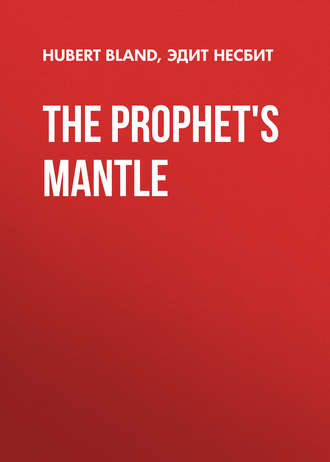
Эдит Несбит
The Prophet's Mantle
CHAPTER XXX.
TALKING THINGS OVER
BEFORE the echo of that cry had died away, the man who had uttered it swayed sideways, his face grew deadly white, the clasp of his arms loosened, and only the sudden firm grip of the other saved him from falling. Petrovitch laid him on the sofa. Then he passed into the adjoining bedroom, and came back with a wet sponge.
'What a fellow it is,' he said to himself, as he applied it to the hands and face of the insensible man. 'As brave as a lion, and as hysterical as a schoolgirl.' But he looked very kindly on the pale face as he administered his remedies.
In a little while the eyes opened, and the younger man struggled into a sitting position, and looked into the face that bent over him.
'Litvinoff, it is you, then?' he said in a low voice, and covered his face with his hands. The joy of seeing once more the man he had loved seemed to be swallowed up in the shame of meeting the man he had wronged.
'Yes, Percival, it is I,' said Petrovitch; 'but let this be the last time you call me Litvinoff, and I must not call you Percival either. I think I have a right to ask that. You have chosen to put on the Prophet's Mantle, and for all our sakes you must wear it a little longer.'
'What do you mean?'
'I mean simply that you must still be Count Litvinoff, and I must still be Petrovitch.'
'Then you are Petrovitch! Why did you take a false name to mislead me?' he groaned. 'Why did you let me go on wearing your name, and spending your money? Why not have let me know at once, when every day made things worse? I would have gone out of life long ago rather than face this meeting.'
'And yet you seemed glad to see me, too?' said Petrovitch, looking at him curiously. 'But I took no false name; my name is really Petrovitch. My father's name was Peter, you know. You ought to remember that. You have heard me called by it often enough.'
'I never thought of you by it, though; and besides, I thought you were dead. You know that I thought you were dead?' with a sudden, quick doubt in his voice.
'Of course!'
'You know, don't you,' he went on eagerly, 'that I would gladly have given my life for yours, and that I never hoped for anything so good in this world as to see you alive? Yes, in spite of everything, though I can't expect you to believe it,' he ended bitterly.
'I have never doubted it,' Petrovitch answered; and with a sudden thrill of pity for the despair, the remorse, the longing, and the wretchedness in the other's face, he added, 'Come, old friend, don't take this so much to heart. It is nothing that cannot be put right. You will see when we come to talk it over quietly. Can't we have some tea?'
Petrovitch knew well enough that when the heart's cords are stretched almost unbearably by the strain of an intense emotion, it sometimes stems as though they could only be saved from giving way altogether by the direction of the mind to some utterly trivial detail of everyday life. Many a woman's heart has been saved from breaking by the necessity of getting the children's dinner, and many a tragedy has been averted by the chief actor's having to take in the afternoon's milk.
Petrovitch repeated the question, 'Can't we have some tea?'
The other rose mechanically, went to a cupboard, and brought out a plated kettle and spirit-lamp, a small china tea set, and a plate of lemons, with a silver knife. He put these appliances on the table in an unmethodical, untidy sort of way, and was proceeding to light the spirit-lamp, when Petrovitch, who had been watching him with a smile, took the match-box out of his hand.
'Here, let me make tea. I see you are just as unsystematic as ever.' He lighted the lamp, and with a few deft touches put the rest of the tea-things in order, as the other, leaving the matter in his hands, strode up and down the room.
'Oh, what is to be the end of all this?' he said at length; 'how long am I to go on bearing your name?'
'All this will soon be at an end, as far as I am concerned. I have nearly completed my arrangements for getting back to Russia, and when I'm there you may guess it won't matter to me who bears my name. I shall not wish to use it. But while I am here I wish to be Petrovitch. Indeed, you can serve me best by letting it be as widely known as possible that Count Litvinoff is—well, where you are and not where I am, and after all it's nobody's business but yours and mine.'
'Does no one else know of it at all?'
'Only two men in St Petersburg, and one in London.'
'And he is?'
'Hirsch, whom you've seen, I think.'
'Why the devil didn't he tell every one then?'
'Because I asked him not to, and he considers himself under some sort of obligation to me.'
'Like everyone else you come across. But how came he to know it?'
'He had to be told when I came here. There was certain work I had to do; I can tell you about it another time, and he was the only man who could put me in the way of it. Now Count Litvinoff, the tea is ready.'
The other stopped in his walk.
'Curse it!' he said passionately. 'Call me a villain or a forger, or any other pretty name you like; I can stand that, but not your lips calling me by your name. It's a cruel revenge.'
'Ah, we owe too much to our enemies for there to be any thought of revenge between friends, and I must teach myself to call you that. Besides, what is there to revenge? You have only used the name I did not need.'
'No, I forged your name as well as stole it. You don't know all.'
'Yes, I do, or pretty nearly all. As far as your taking my name goes, that has done no harm; rather good; and as for the money, that would have gone to you. You know, if I had had the giving of it, it would have gone to you. And I know you would never have touched it if you had not thought I was dead.'
'I wish I had never left you, though I did think it, and at the mercy of those curs. If only I had died by you!'
'You know well enough our rule is that none should be sacrificed without reason. Why should you have given those hounds two lives instead of one?'
'I wish I had died that night under the orange trees at Monte Carlo. You did yourself a bad turn when you saved my life. I have done no good with it. I have only weighted myself with unpardonable sins.'
'As far as I am concerned,' Petrovitch said, 'if there is anything to forgive, it is freely forgiven—freely and fully; and now let us shake hands after your English fashion, and of forgiveness let us talk no more. We are friends, and between such it is no question of pardon. And there are many other things we must speak of.'
He held his hand out, and the younger man grasped it. There was a moment's pause. Then,—
'Let me give you some fresh tea—that is cold,' said Petrovitch cheerfully, pouring out another cup; 'don't you want to hear what happened to me after I was killed?'
'I can hardly realise yet that you are not killed.'
'Well, I'll tell you about it. The officer of that troop added medicine to his other accomplishments, besides which he was a distant relation of my mother's, and he insisted on seeing whether I could not be conjured back to life. I believe I gave them a good deal of trouble, but I seem to be a die-hard. My capture was kept very quiet, thanks to my family name, for the Government didn't care about having it known that the head of the Litvinoffs had tried to atone for the crimes of his family by taking the side of the people. My wound was a bad one, and even now troubles me sometimes. I used sometimes almost to wish it had settled me. Fancy being in prison, and a Russian prison, with a wound like that.'
'But how did you get away?'
For answer Petrovitch told him the story of his escape as he had told it to Hirsch and to his other friends, intentionally making the recital a long one, so that his companion might have time to get used to the new situation before they began to talk of the future.
'And now,' he said, when he had ended, 'tell me how it fared with the Secretary.'
'I hate to think of it,' said the man who had borne the Litvinoff name for three years, and who, it seemed, was to bear it a little while longer. 'Whenever I think of that night, I see nothing but your face—dead, as I thought—turned up from the snow in the hateful dawn. Oh, my friend!' his voice faltered, and he held his hand out to Petrovitch again. After a pause, he resumed, 'I tried all I knew to revive you, but you were as cold as ice, and your heart did not beat. I stayed by you a long, long time. It did not occur to me to leave you, but at last, in a flash, I realised that you were gone—that I was there in the snow alone. And then I thought of escape. I said good-bye to your body. I felt as if your self was far away somewhere, and then I sprang up and dashed off in the direction we had been taking. It was broad daylight then, but I saw nothing of the soldiers, though I knew afterwards they must have found you, because when we sent, your body was gone. I must have kept pretty straight, for I came to a house at last, and I went straight up to it. I thought it must be Teliaboff's, and if it wasn't I felt I didn't much care. I went right in, asked for the master of the house, and when he came to me I told him all. It was Teliaboff. He was very good to me, and kept me there nearly a fortnight. We could hear nothing of you—nothing at all. By the way, it was he who first, unconsciously, gave me the idea of personating you, for when I entered his house on that horrible morning he greeted me by your name. I undeceived him at once, but the idea took root and bore fruit later. He was kindness itself, and his little daughter—she was only twelve, I think—took a fancy to me. I believe that child's companionship saved me from going mad.
'Then he got me a passport, and gave me money enough to get to Vienna. When I got there I was penniless, and I knew you had had money there. I did not feel somehow that I was robbing you when I forged your name—Heaven knows that was easily done, I knew your signature so well—and went on to Paris with your money as Count Michael Litvinoff. When I took your money I meant honestly to spend it all in the cause you had worked for, and for a time I did. But—I don't know how to explain it—I suppose the Revolution had not really taken hold of me. It was you I had cared for, and your creed I had held, not for itself, but because it was yours. And when your personal influence was not near me I grew careless and idle, and worked for Liberty only by fits and starts. It used to seem too much trouble to do things for the cause. It had been your approval I cared for, I think. You are so strong, I can't expect you to understand the imbecilities of such a weak fool as I am. From the moment when I ceased to spend all my time and all your money on your work, I seemed utterly degraded in my own eyes, and it did not seem to matter what I did, so I have gone on from bad to worse, and the principles you would die for, have only been will-o'-the-wisp lights to lead me into direr troubles than I should ever have known without them. I have not kept Michael Litvinoff's name clean. And the evil I have done is nothing to what I have tried to do. I sent Teliaboff his money back, but I have never heard from him. Have you? Do you know whether he is all right?'
'Haven't you heard?' Petrovitch asked gravely.
'Heard? No! What? Anything wrong?'
'Hanged,' was the brief reply.
'Hanged!'
'Yes, and his little daughter—she was fourteen, then, I think—was hanged with him.'
'For—for helping me?' gasped Litvinoff.
'No, for having "The Prophetic Vision" in her room.'
'My God!' cried Litvinoff, springing up. 'How long will men bear it? Let us go back this very day, and kill and kill and kill these fiends as long as we have an arm to strike or a finger to pull a trigger.'
'We are going back,' Petrovitch said quietly. 'As for that deed, it is avenged. The man who was responsible for that murder got his sentence of death and his notice of it two days later. He lived through three months of terror, and then shot himself, to escape execution at the hands of some of us. Don't talk more of him.'
The two men sat silent for a little while, but Litvinoff's eyes still blazed with excitement. Petrovitch smoked quietly.
'How was it,' Litvinoff asked presently, turning from the other subject with evident effort, 'that you did not let me know directly you came over?'
'I did not see any good to be gained by it,' answered Petrovitch, who did not choose to tell his friend that he had waited to see with what grace the Prophet's Mantle was worn. 'I heard you speak at the Agora. I read your writings. You seemed to be doing good. Besides, it made concealment of my purposes more easy not to be known as Litvinoff.'
'Then what made you decide to tell me now?' was the very natural question.
Petrovitch hesitated, but only for a moment. Then he said,—
'Frankly, because I thought you were meditating an action that would afterwards cause you more regret than anything else you have done, and I wished to prevent it.'
'And that action was?'
'Taking another wife while your first wife still lived and still loved you.'
Petrovitch spoke slowly and distinctly.
Litvinoff leaned forward in his chair and looked at him amazedly.
'By Heaven!' he said, leaning back with a sort of sigh, 'you seem to know everything.'
'I have made it my business to know.'
'Not quite everything in this case, though,' Litvinoff added, correcting himself, 'for I have no wife.'
Petrovitch's eyes flashed angrily.
'I was not speaking in the phrase of your London society. I did not suppose that you were going to commit an illegal act. I merely imagined that you had intended to commit a crime. I am not mistaken in supposing that you always led the woman in question to believe that you looked upon her as your wife?'
'You are not mistaken—you are right. I did contemplate a crime,' he said, walking over to the bookcase, and standing so that his face was not to be seen. 'I have no defence to offer; but at the time I first contemplated it I deceived myself with the idea that I had. But my wife left me. I did not leave her. I never could have left her; and if she had not left me that vile idea of marrying another woman would never have entered my head. However, that's all at an end now, I'm thankful to say, and I mean to find my wife'—there was no hesitation in his voice this time—'and legalise her position with bell, book, and candle, and any other rites that may seem to her desirable.'
'Regardless of principles?' said Petrovitch, with the faintest possible sneer.
'Damn principles!' Litvinoff cried, turning round, stung by the tone. 'I would have sacrificed them for a woman I merely admired, and they sha'n't stand between me and the woman I love.'
'How do you propose to find her?'
'I haven't the slightest idea. Do you know where she is?' he added sharply.
'Do you remember giving £10 to a man named Hirsch in the autumn?' was the counter-question.
'I do?' with an inquiring look.
'That was for your wife!'
Litvinoff drew a long breath. 'Go on!' he said, simply.
Then Petrovitch told him all that he knew of Alice, and Litvinoff listened intently. When Petrovitch spoke of the night on Blackfriars' Bridge, he leaned forward breathing heavily, then rose suddenly, and, crossing to a couch, flung himself, face downwards, on it. Petrovitch paused.
'Go on! Go on! Go on!' said an impatient, stifled voice from the couch.
So Petrovitch resumed.
When the tale was told, Litvinoff rose. He was very pale, his lips trembled a little, and his dark eyes were shining and wet.
'When can I see you to-morrow? I am going to Chislehurst now. I don't thank you; it would be absurd. Thanks are idiotic under some circumstances. You saved my life—which I didn't care about—and now it seems you've saved what I do care for, as much as such a scamp as I can care for anything. But you don't need my words. I believe you understand me—if any one does.'
Petrovitch rose and laid his hand on his shoulder.
'Do not go to-night,' he said. 'She is not strong yet, and you are too excited to meet her calmly. Wait till to-morrow. You may trust her safely where she is for another night. Besides, there is very, very much to be said between us—both of the past and future.'
'Well, you have a right to command me,' Litvinoff answered, frowning and a little stiffly, and then was silent a moment. Then he said suddenly, flinging himself into his chair with the frown quite gone, 'You're right—you always are, and there is much to be said. I wish to God there could be some way of wiping out the past, or rather of atoning for it. Do you know, it seems to me that I shall have a chance of seeing my way to doing something worth doing now you have come back. I could almost swear at this moment that I believed as heartily as ever in liberty, humanity, progress, and all the other things you taught me to swear by, but in my soul I know it is you I believe in—always have believed in— I've never believed in anything but you for more than three months at a time. Peculiar, isn't it?'
'You haven't altered in the least,' said Petrovitch smiling. 'You were never sure of your beliefs except when you were fighting for them. You should be back in Russia. Persecution is a splendid antidote to religious doubt. Men like you ought not to live in England. There is too much freedom in the air and it doesn't agree with you. You get to think there is nothing worth fighting for here. There is, though, and some Englishmen are beginning to find it out.'
'You are going back to Russia?' Litvinoff said, interrogatively.
'Yes.'
'Let me come with you,' he cried, impulsively. 'Give your Secretary another chance.'
'Ah, my days of quiet writing are over now. The battle grows hot. I don't want a Secretary, I want a comrade in arms. Will you go to Servia for me?'
'I'll go to hell, if you like,' was the direct reply.
'The two will soon be synonymous, if all I hear is correct. But what about your wife?'
'It used to be one of your principles,' Litvinoff said, using the word, as it were, reluctantly, 'that if a man believes in anything enough to place himself in danger for it, he should not hesitate to risk all he holds precious for the same end; and my wife is not a coward, she would go with me.'
'Poor little woman,' said Petrovitch; 'but that was and is one of my principles. If you go to Servia under my name I shall have a far better chance of getting back to St Petersburg under someone else's. And the risk to your wife is of the slightest, for it is a peaceful errand I will send you on.'
'I hate peaceful errands.'
'I dare say there'll be a little excitement thrown in—but don't rush into danger. There is no need there, and it can do no good. I know hard fighting is the easiest; but our business is to do the thing which has to be done, be it peace or be it war.'
'Ah!' said Litvinoff, with enthusiasm; 'to act up to that ideal is easy enough for men like you, but you must remember that such men as you are as far above the rest of us as the Christian martyrs are above the average church-goer. You are the Saints of the New Religion.'
'Don't you think we'd better go and have some dinner?' said Petrovitch, drily.
CHAPTER XXXI.
'MY LITTLE GIRL.'
THE suggestion was a good one, and the dinner to which the two sat down had a steadying effect on the nerves of the younger man. He became calmer, and when they returned to his rooms he was able to bear his part in a long, earnest, quiet talk over events past and to come.
The talk lasted far into the night, and before they parted it was settled that Litvinoff should leave for Servia in two days, taking with him certain important papers from Petrovitch to another of the Nihilist leaders. That he should there wait instructions, and should enter Russia by the southern frontier, and rejoin the circle at St Petersburg, leaving his assumed name at Belgrade. That the following imaginative announcement should be inserted in as many English papers as possible for the special edification of the Russian Embassy.
'Count Michael Litvinoff left London for Dover this morning, en route for Belgrade. He was accompanied by Countess Litvinoff, an English lady to whom he was secretly married some time ago. Count Litvinoff, so well known to many of our readers through his "Social Enigma," his "Hopes and Fears for Liberty," and his many revolutionary brochures, has never been a familiar figure in London society, his literary labours having compelled him to live in strict retirement. It will be remembered that he was the hero of an adventure on the Russian frontier some years ago, was wounded, captured, and sent to a Russian prison, from which he escaped to England.'
It was also settled that the money for the journey should be taken from the remainder of the Litvinoff capital.
When Litvinoff began to speak of the money he had spent and the debts he had incurred, Petrovitch stopped him with,—
'I'll see to your debts—and what is gone is gone. Don't let us waste words over that.'
It was arranged that Petrovitch should seek out John Hatfield and his wife, and should let them know that their daughter was happily married. They judged it best not to subject Alice to an interview which could not but involve most painful explanations, and they agreed that it would be cruel both to her and to her parents to let them meet, merely to part again at once. Of Clare Stanley neither of them spoke one word.
A new day was some way into its small hours when they said good-bye.
'We meet in St Petersburg, then, as soon as may be,' Petrovitch said. 'I shall not see you again till then.'
'I hope by that time I shall have done something to prove to you that you have indeed brought me back to the ranks of duty and the Revolution.'
'I don't need proof,' said the other with one last hand-pressure. And so they parted.
Next morning early, Litvinoff went down into the City, where he paid a disproportionate sum of money for a paper which empowered him to marry his wife at once, instead of waiting three weeks for that privilege. Then he went down to Chislehurst. The sky was clear and pale and blue, and the sun shone divinely. The trees that had been brown seemed at a little distance to be wrapped in a grey gauze veil, as they always do when the green buds first break out to new life.
As Litvinoff walked up the hill to Chislehurst Common, he tried to think what he should say to Alice, how she would look, how she would speak to him. With a touch of ingrained cynicism, he laughed at himself to find that his heart was beating tumultuously, and that his hands were trembling.
'And this is the man,' he said contemptuously to himself, 'who walked behind her for half-an-hour last autumn, and never spoke to her! No, not the same man,' he added, after a pause, 'I am purged of a crime since then.'
The house where he was to seek Alice was a little yellow-brick building near the church.
He looked at the pretty old-fashioned churchyard as he passed, and then at the building itself.
'I suppose,' he said to it, 'you will be the balm the child will choose to ease her sorrow—and you will bring comfort to her, as you have to thousands of others. I don't grudge them their comfort, but I do grudge you your influence. However, you won't keep it much longer. Tant mieux.'
His hand was on the garden gate—he unlatched it, and walked up to the smallest detached house he had ever beheld. He raised the diminutive knocker, and assaulted therewith the tiny brown door. Would she open it? She did not. It opened—and Litvinoff at first really thought it opened of its own accord. At anyrate it opened by some agency invisible to him. He stood and looked; but when the door slowly began to close again, he thought it was time for action. He came a step forward, and addressing nothing, said,—
'Is Mrs Litvinoff in?'
Then a very small girl in a yellow pinafore and a lilac frock showed herself from behind the door; but shyness and an incomplete knowledge of her native tongue combined to render her speechless. Litvinoff, with an impatient but perfectly gentle movement, lifted her bodily from her position as guard, and placed her outside the door.
'The air will brighten your wits, mon petit chou,' he said.
Then he walked straight into the house, and looked round the two rooms on the ground floor. Empty. He passed through the kitchen, whose proportions would have served for those of the corresponding apartment in a good-sized doll's house, and found himself in a brick-paved back yard, where there were a water-butt, a basket of wet linen, some clothes-lines, and the lady of the house. Regardless of her astonishment, he addressed himself to her.
'Oh, Mrs Litvinoff?' she answered curiously, 'she is out; she has gone to Orpington for some butter for me, sir, and she won't be long.'
'How long?'
'Perhaps an hour.'
'Is she alone?'
'Yes, sir.'
'If you'll be kind enough to tell me the way, I think I'll go and meet her.'
'And who shall I say called if you should miss her, and she comes back first?'
'Say her husband,' answered Litvinoff.
The woman gave him profuse directions, for which he thanked her with his usual empressement, and turned at the gate to raise his hat in farewell.
'My stars!' said Mrs Bowen, as she watched him out of sight, 'he's a real gentleman, and no mistake. Poor little Mrs Litvinoff,' she added, with a woman's instinctive interest in a romance, 'I hope they'll make it up and live happy ever after, that I do!'
Litvinoff walked along. His heart was lighter than it had been for many a long day. On these delicious fresh spring mornings—
When March makes sweet the weather
With daffodil, and starling,
And hours of fruitful breath,
just to be alive is a rapture. Of course it may be cancelled by care like any other joy. But Litvinoff felt as if he had no cares. He was going to meet the woman he loved, and the nearer he got to her the more he loved her. In love, as in friendship, nearness was everything to him.
Every figure in the distance he thought was her figure. If you have ever gone to meet a person whom you very intensely wished to meet, you will remember how constantly recurring is that illusion. You will remember the spasm of vindictive hate which seizes on you when the figure in the distance is neared, and dispels your illusion by being itself and not the one you wanted it to be.
Paul's Cray Common seemed a paradise to him. It does make a fairly good one under favourable circumstances, with its heather, and gorse, and larch, and oak saplings, and, fairest of all, its graceful swaying silver birches. The birds were singing madly, and as he felt the springy turf under his feet, and the warm spring sun on his shoulders, he began to sing, too, a tender little French song, all about green woodland paths, and youth, and love, and happiness.
Alice Hatfield's heart was very sad, but it was a quiet sadness, that did not shut out the charm of the spring. Under the influence of the young life blood of the year that seemed to be throbbing through that perfect day, she had felt strong, and had walked with more swiftness than usual, and now, as she was returning with a basket, in which her butter lay, under cool green leaves, she began to walk more slowly and to consider two pounds of butter heavier than she had thought it before. She had been revelling among the primroses and dog violets, and had filled up her basket with the pale, yellow primrose stars and the delicate pink and white wind-flowers. She was tired, certainly, and she turned aside and sat down on a felled tree, in a certain little pine copse that runs along by the road-side. The pine needles lay brown, and soft, and thick under her feet. A little bright-eyed, red-brown squirrel came half-way down one of the trees to look at her, but seemed to find her not quite as nice as he had expected, for he whisked his tail with undisguised contempt, and went back to his home with a lightning-like spiral scramble. He must have been a squirrel hard to please, for it is a fact that, in spite of illness and trouble, Alice was far prettier now than when her sweet face had first caught Count Litvinoff's eyes on the Birkenhead Ferry.
She sat quietly gazing through the pine trees, with her head turned from the road. Presently she stooped to attempt the capture of a very young and very yellow frog which had hopped close to her feet, regardless of the pine needles. As she did so her heart stood still, for her ears caught the tramp, tramp of a man's footstep, and the ringing sound of a man's voice, a voice she knew,—
'Viens, suivons les sentiers ombreux,
Ou s'égarent les amoureux
Le printemps nous appelle,
Viens! Soyons heureux!'
She rose to her feet, and involuntarily uttered a low cry. She dared not turn her head. The singing stopped abruptly, there was a crash through the brambles, and in a moment a pair of strong arms were round her, and lips close to her ear murmured,—
'My little girl!'
She rested on his arm for one moment Then she said, in a choked sort of voice, as she tried to release herself,—
'It's no use, I cannot come back. You have not come here to ask me back. Do, do leave me alone!'
He held her fast.
'My darling,' he whispered, 'do you think I could leave you now I have found you? I have come to ask you to come back to me. I have come to ask you to marry me. You will not send me away. I cannot do without my little one any longer. You love me still?' he added, a sudden doubt striking him at her continued silence, and he raised her chin with his hand till he could look in her face. She shrank from his hand, and hid her face against his neck.
'You know,' she answered, 'you know.'
So it came about that Alice married her love who had not been true, and forgave him with all her heart; when she was leaving the church, leaning on her husband's arm, with a new world of love and joy opening before her, and Litvinoff was looking down at her with eyes in which love deepened every moment, her father lay dead at the bottom of the tank in Thornsett Mill. The Litvinoffs left England at once, and to this day Alice does not know of her father's death, and her husband does not know of the dire disaster that followed on his double dealing. I doubt if they will ever learn it now. There is a good deal more that Alice does not know. It is perhaps as well. Wives are none the happier for knowing too much of their husbands' past. As it is, Alice will follow him to the world's end, believing in him unquestioningly.







